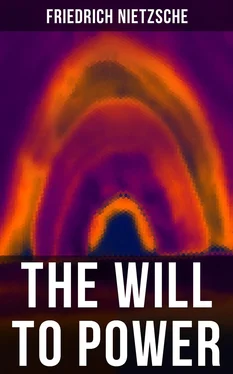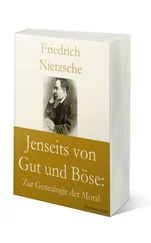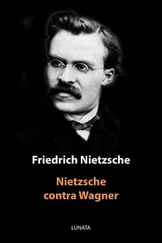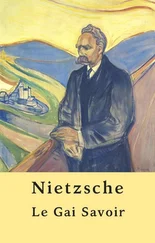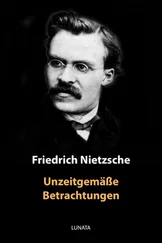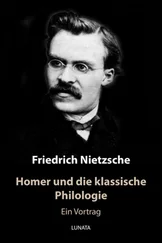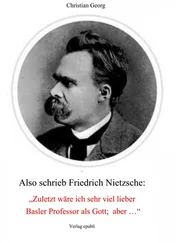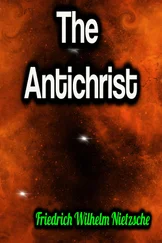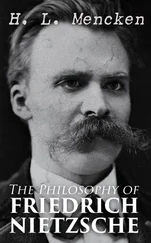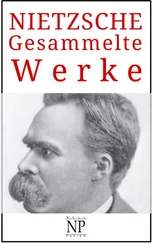The Period of Light : men see that old and new are fundamental contraries; that the old values are born of descending life, and that the new ones are born of ascending life— that all old ideals are unfriendly to life (born of decadence and determining it, however much they may be decked out in the Sunday finery of morality). We understand the old, but are far from being sufficiently strong for the new.
The Periods of the Three Great Passions : contempt, pity, destruction.
The Periods of Catastrophes : the rise of a teaching which will sift mankind ... which drives the weak to some decision and the strong also.
1.This is a Kantian term. Kant recognised two kinds of Freedom—the practical and the transcendental kind. The first belongs to the phenomenal, the second to the intelligible world.—TRANSLATOR'S NOTE.
2.This probably refers to Kant's celebrated table of twelve categories. The four classes, quantity, quality, relation, and modality, are each provided with three categories.—TRANSLATOR'S NOTE.
3.See Note on p. 11.
4. zerdachtere .
II. Concerning the History of European Nihilism
(a) Modern Gloominess
Table of Contents
57.
My friends, we had a hard time as youths; we even suffered from youth itself as though it were a serious disease. This is owing to the age in which we were born—an age of enormous internal decay and disintegration which, with all its weakness and even with the best of its strength, is opposed to the spirit of youth. Disintegration—that is to say, uncertainty—is peculiar to this age: nothing stands on solid ground or on a sound faith. People live for the morrow, because the day-after-to-morrow is doubtful. All our road is slippery and dangerous, while the ice which still bears us has grown unconscionably thin: we all feel the mild and gruesome breath of the thaw-wind—soon, where we are walking, no one will any longer be able to stand!
58.
If this is not an age of decay and of diminishing vitality, it is at least one of indiscriminate and arbitrary experimentalising—and it is probable that out of an excess of abortive experiments there has grown this general impression, as of decay: and perhaps decay itself.
59.
Concerning the history of modern gloominess.
The state-nomads (officials, etc.): "homeless"—.
The break-up of the family.
The "good man" as a symptom of exhaustion.
Justice as Will to Power (Rearing).
Lewdness and neurosis.
Black music: whither has real music gone?
The anarchist.
Contempt of man, loathing.
Most profound distinction: whether hunger or satiety is creative? The first creates the Ideals of Romanticism.
Northern unnaturalness.
The need of Alcohol: the "need" of the working classes.
Philosophical Nihilism.
60.
The slow advance and rise of the middle and lower classes (including the lower kind of spirit and body), which was already well under way before the French Revolution, and would have made the same progress forward without the latter,—in short, then, the preponderance of the herd over all herdsmen and bell-wethers,—brings in its train:—
(1) Gloominess of spirit (the juxtaposition of a stoical and a frivolous appearance of happiness, peculiar to noble cultures, is on the decline; much suffering is allowed to be seen and heard which formerly was borne in concealment);
(2) Moral hypocrisy (a way of distinguishing oneself through morality, but by means of the values of the herd: pity, solicitude, moderation; and not by means of those virtues which are recognised and honoured outside the herd's sphere of power);
(3) A really large amount of sympathy with both pain and joy (a feeling of pleasure resulting from being herded together, which is peculiar to all gregarious animals—"public spirit," "patriotism," everything, in fact, which is apart from the individual).
61.
Our age, with its indiscriminate endeavours to mitigate distress, to honour it, and to wage war in advance with unpleasant possibilities, is an age of the poor. Our " rich people "— they are the poorest! The real purpose of all wealth has been forgotten.
62.
Criticism of modern man :—"the good man," but corrupted and misled by bad institutions (tyrants and priests);—reason elevated to a position of authority;—history is regarded as the surmounting of errors;—the future is regarded as progress;—the Christian state ("God of the armies");—Christian sexual intercourse (as marriage);—the realm of "justice" (the cult of "mankind");—"freedom."
The romantic attitudes of the modern man;—the noble man (Byron, Victor Hugo, George Sand);—taking the part of the oppressed and the bungled and the botched: motto for historians and romancers;—the Stoics of duty;—disinterestedness regarded as art and as knowledge;—altruism as the most mendacious form of egoism (utilitarianism), the most sentimental form of egoism.
All this savours of the eighteenth century. But it had other qualities which were not inherited, namely, a certain insouciance, cheerfulness, elegance, spiritual clearness. The spiritual tempo has altered; the pleasure which was begotten by spiritual refinement and clearness has given room to the pleasure of colour, harmony, mass, reality, etc. etc. Sensuality in spiritual things. In short, it is the eighteenth century of Rousseau.
63.
Taken all in all, a considerable amount of humanity has been attained by our men of to-day. That we feel this is in itself a proof of the fact that we have become so sensitive in regard to small cases of distress, that we somewhat unjustly overlook what has been achieved.
Here we must make allowances for the fact that a great deal of decadence is rife, and that, through such eyes, our world must appear bad and wretched. But these eyes have always seen in the same way, in all ages.
(1) A certain hypersensitiveness, even in morality.
(2) The quantum of bitterness and gloominess, which pessimism bears with it in its judgments—both together have helped to bring about the preponderance of the other and opposite point of view, that things are not well with our morality.
The fact of credit, of the commerce of the world, and the means of traffic—are expressions of an extraordinarily mild trustfulness in men.... To that may also be added—
(3) The deliverance of science from moral and religious prejudices: a very good sign, though for the most part misunderstood.
In my own way, I am attempting a justification of history.
64.
The second appearance of Buddhism. —Its precursory signs: the increase of pity. Spiritual exhaustion. The reduction of all problems to the question of pleasure and pain. The glory of war which calls forth a counter-stroke. Just as the sharp demarcation of nations generates a counter-movement in the form of the most hearty "Fraternity." The fact that it is impossible for religion to carry on its work any longer with dogma and fables.
The catastrophe of Nihilism will put an end to all this Buddhistic culture.
65.
That which is most sorely afflicted to-day is the instinct and will of tradition : all institutions which owe their origin to this instinct, are opposed to the tastes of the age.... At bottom, nothing is thought or done which is not calculated to tear up this spirit of tradition by the roots. Tradition is looked upon as a fatality; it is studied and acknowledged (in the form of "heredity"), but people will not have anything to do with it. The extension of one will over long periods of time, the selection of conditions and valuations which make it possible to dispose of centuries in advance—this, precisely, is what is most utterly anti-modern. From which it follows, that disorganising principles give our age its specific character.
Читать дальше
